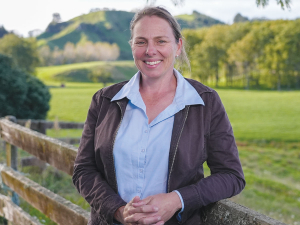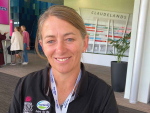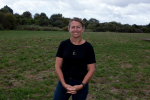Humbling, overwhelming, and an absolute honour. That’s how 2024 Fonterra Dairy Woman of the Year Katrina Roberts describes her win at the Dairy Women’s Network conference earlier this month.
Roberts, a herd health veterinarian and dairy consultant, says she is still processing the win.
“It’s been a bit of a whirlwind few days,” she told Dairy News.
Roberts has worked as a vet in the dairy industry for more than 20 years.
Her work within the dairy industry started as a vet student at the University of Melbourne when she began working on a research project with Professor Jock MacMillan. She says it was that research project, looking at cattle reproductive physiology, that started her on the path she’s on today.
“And so, while I was doing practical work in final year, Jock suggested that I come to New Zealand and meet Scott McDougall, who was one of Jock’s earliest PhD students,” she says.
McDougall was working at what was then Animal Health Centre (now Anexa) in Morrinsville, and had set up a research division as part of that practice.
Roberts joined Animal Health Centre in 2003, starting work as a dairy vet.
“But alongside being a dairy vet, I was also doing my masters in epidemiology, so I was halftime working as a dairy clinician, and half-time doing research through Massey,” she says.
Roberts masters project investigated risk factors and prevention strategies for heifer mastitis in NZ.
“It was a real problem that our farmers were extremely frustrated by,” she says. “There weren’t really any effective strategies back then. There were a few ideas that had been tried but nothing really broke the back of the problem.
“There were herds I was working with that were getting 20 to 30% clinical mastitis rates in their heifers within the first month of calving, so horrific wastage in terms of antibiotics, animal welfare, lost quarters, and reduced production, which is massive.”
One of the strategies that Roberts and her fellow researchers found worked was putting an internal teat sealant into heifers four to six weeks before calving.
“And it was unbelievable, it was so effective, we achieved 50-70% reduction in clinical mastitis,” she says. This prevention strategy is widely adopted across the industry now.
For a few years after completing that research, Roberts worked as a full-time dairy vet out of branch clinics in Te Aroha and Matamata – where she still works today.
“The programme was adopted and myself and others were in that very first group that were trained.”
It was during that training that Roberts discovered she wanted to work in the herd health space “to really affect change on-farm”, and she’s still involved in the program today.
She says it was while working with farmers on herd health that she realised that to lead change on farm, particularly in the herd reproductive space, she would need to understand the whole farm system, thus leading to her work as a dairy farm consultant.
“All of a sudden I realised that, if I’m going to actually help my farmers improve their reproductive performance, I need to understand the whole farm to be able to work alongside my farmers.”
Volunteer Role
In her spare time, Roberts volunteers on a Friday with Cambridge Riding for the Disabled.
“I think volunteering is the best thing ever. One of the things I love about RDA is that all the volunteers, they’ve all had busy weeks, they all have things going on in their life and then when they get to RDA they’re all there for the sole purpose of helping the riders, using the horses as a tool to help those kids grow and develop and have a bit of normality,” she says.
“I think giving our time is something that people struggle with in the current busyness of life and it’s so worth it.”
So, what's next?
“I’m really looking forward to opening my mind to other areas of NZ agriculture and seeing what those people are doing with the Kelloggs Rural Leadership Scholarship,” she says.
“Winning this award allows the platform for me to demonstrate the important role that female dairy vets have within the dairy farm team. The strong long-term relationships we have with our farmers leads to success for farmers, vets, the cows and the wider dairy industry – it’s a win-win,” she says.

















